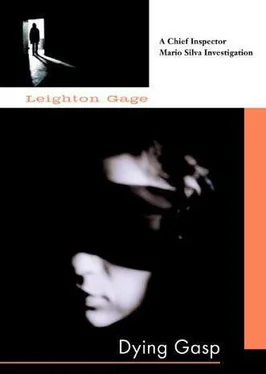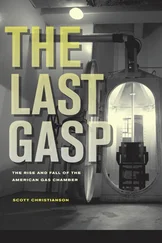Leighton Gage - Dying Gasp
Здесь есть возможность читать онлайн «Leighton Gage - Dying Gasp» весь текст электронной книги совершенно бесплатно (целиком полную версию без сокращений). В некоторых случаях можно слушать аудио, скачать через торрент в формате fb2 и присутствует краткое содержание. Жанр: Полицейский детектив, на английском языке. Описание произведения, (предисловие) а так же отзывы посетителей доступны на портале библиотеки ЛибКат.
- Название:Dying Gasp
- Автор:
- Жанр:
- Год:неизвестен
- ISBN:нет данных
- Рейтинг книги:5 / 5. Голосов: 1
-
Избранное:Добавить в избранное
- Отзывы:
-
Ваша оценка:
- 100
- 1
- 2
- 3
- 4
- 5
Dying Gasp: краткое содержание, описание и аннотация
Предлагаем к чтению аннотацию, описание, краткое содержание или предисловие (зависит от того, что написал сам автор книги «Dying Gasp»). Если вы не нашли необходимую информацию о книге — напишите в комментариях, мы постараемся отыскать её.
Dying Gasp — читать онлайн бесплатно полную книгу (весь текст) целиком
Ниже представлен текст книги, разбитый по страницам. Система сохранения места последней прочитанной страницы, позволяет с удобством читать онлайн бесплатно книгу «Dying Gasp», без необходимости каждый раз заново искать на чём Вы остановились. Поставьте закладку, и сможете в любой момент перейти на страницу, на которой закончили чтение.
Интервал:
Закладка:
Dying Gasp
Leighton Gage
Chapter One
AMSTERDAM, THE NETHERLANDS
The bomb aboard the number nine tram claimed seventeen lives. Sixteen were passengers.
The seventeenth was the driver of a nearby postal truck. Mail from his shattered vehicle littered the cobblestones in front of the Museum of the Tropics and fluttered, like tiny flags, from the branches of the linden trees.
An hour later, in a shaky VHS video delivered to the studios of Al Jazeera in Dakar, a masked man, posing in front of a green banner, took responsibility for the outrage. A group calling themselves Justice for Islam, he said, had acted “in reprisal for Dutch support of the American crusaders’ continuing occupation of Iraq.” The Dutch had withdrawn their last troops from Iraq long since, but that was something the terrorists chose to overlook.
The incident took place on a glorious April day, chilly but without the usual breeze. The absence of wind ensured that much of the scattered mail stayed in the area of the blast instead of littering the neighboring streets and being blown into canals.
As soon as the authorities liberated the area around the truck, postal employees moved in and gathered up what they could. The salvaged mail was stuffed into canvas sacks and carried away to the Central Post Office on the Oosterdokskade, where a team under the leadership of Postal Inspector Marnix Gans started sorting it.
Some of the letters and packages were relatively undamaged. These were immediately fed back into the system and sent on their way. Some pieces had suffered the effects of the explosion, the resulting fire, and the water that had been used to put the fire out. Wherever addresses were still legible, tape was used for repairs and that mail, too, was sent on its way. Finally, Gans’s team got down to the hard part: trying to piece together fragments and subjecting charred remnants to ultraviolet and infrared lights in an attempt to decipher addresses unreadable to the naked eye.
A few of the mystery envelopes had the same characteristics. They were square, made of a manila paper almost as strong as cardboard and lined with a protective plastic permeated with tiny bubbles. One of them had been torn open by the explosion. It contained a digital video disk. The DVD itself was neither damaged nor labeled. There was nothing else inside the envelope.
Jeroen Velder, the only sorter on the team who was still young enough to be taken for a student, gathered the envelopes containing DVDs, put them into one of the plastic sorting boxes, and deposited the box on the desk of Inspector Gans.
“What’s this?” Gans said.
“Unreadables, mijneer. Fourteen of them, all alike. All DVDs, I suppose.”
“You suppose?”
“One of the envelopes is torn, mijneer. I didn’t want to open the others without permission.”
“Quite right. No return address either, eh?”
“ Nee, mijneer.”
Always “mijneer,” never “Marnix.” Unlike most youngsters of his generation, Velder expressed proper respect for his superiors. As long as Marnix Gans was in charge, Velder’s future prospects were bright.
Gans stared at the contents of the box. What he obviously needed was a DVD player. But if his superiors drew the conclusion that Gans wanted the player as a permanent addition to the employee’s lunchroom, with the attendant risk that Gans and his buddies might fritter away their time in there watching American movies, the authorities would feel compelled to look into the matter. Approval of the requisition, if it came at all, could take weeks.
Gans was a proponent of order, a man who took deeply to heart his mandate to rapidly dispatch the queen’s mail. The thought of having those DVDs hanging around for weeks, maybe months, was anathema to him. Yet it was strictly against the rules to take anything home. If a piece of mail not his own was found on his person when he was leaving the building, he’d be in trouble.
Gans decided he’d take the risk. He’d bring the DVD back to his house, pop it into his player and see if the content could give him a clue to the addressee or the sender.
As was his custom, Gans left promptly at five, the damaged envelope containing the DVD in the pocket of his nylon ski jacket.
Sun in Amsterdam, rare in April, seldom brings warmth. As Gans walked the few hundred meters westward toward the entrance to the Central Station, a cool breeze was blowing from the east. He pulled up his hood, tightened the cord at his throat, and reflected that if the wind had been blowing earlier in the day they wouldn’t have recovered half of what they did.
He caught his usual train and disembarked in Haarlem at 5:31. He went to the rack at the back of the station, unlocked his bicycle, and pedaled home to his apartment on the Ambonstraat, arriving well before dark. He locked his bike in the storage shed and climbed the two flights of stairs. The television in the flat below was blaring in some unintelligible language. He thought it might be Turkish. His was a mixed neighborhood with more than its share of unassimilated immigrants. An exotic meal, something offensive to his sense of smell, was being prepared in the kitchen of the apartment next door. He wrinkled his nose.
Gans was a Haarlemer born and bred. He resented the invasion of his territory by swarthy-skinned foreigners, and he especially resented them after the events of the day. Noise, foul smells, and now a bomb on the streets of Amsterdam. Could it get any worse?
His immaculately clean little flat of just over forty-five square meters was divided into four spaces: a small bedroom, an even smaller kitchen, a truly tiny bathroom (with a shower, no bathtub), and a reasonably spacious living area with a balcony. The balcony he seldom used, because it was usually too cold and overlooked the playground of a school where the kids were always shouting at each other in whatever damned language they spoke back home in Northern Africa or wherever they came from.
Gans took off his jacket and hung it on the peg to the left of the door. Then he went into the kitchen, piled some boeren Kool -chopped cabbage-onto one of his microwave-resistant plastic plates and added a piece of smoked sausage. While he was waiting for it to heat, he remembered the DVD and returned to the hall to fetch it. Then he went back into the kitchen and picked up some utensils, a bottle of Oranjeboom, a glass, and a paper napkin. The utensils and the napkin he put on the coffee table. The beer he poured into his glass. The DVD he loaded into his player, pressing the pause button to make sure it wouldn’t start until he was ready.
Five minutes later, his dinner in one hand and his half-empty glass of Oranjeboom in the other, Gans went back into the living room and sat on the couch. He put down the food and drink, picked up the remote control, and hit the PLAY button.
Fourteen minutes after that, Marnix Gans stumbled into his bathroom and vomited everything he’d just eaten into the toilet.
Then he called the police.
Chapter Two
BRASILIA, BRAZILIAN FEDERAL DISTRICT
Nelson Sampaio pushed away from his desk, distancing himself from his chief investigator. “They’re doing what?”
“Raping Nardoni five or six times a day,” Mario Silva repeated, “which is exactly the reason I put him there.”
Sampaio, the director of the Brazilian federal police, held up a faultlessly manicured hand. The gesture reminded Silva of a traffic cop.
“Wait a minute,” he said. “Are you telling me you expected the man to be sexually abused?”
“More than ‘expected,’ I counted on it.”
“Explain yourself.”
Silva looked out of the window. A buzzard was flying lazy circles over the roof of the Ministry of Culture across the way.
Читать дальшеИнтервал:
Закладка:
Похожие книги на «Dying Gasp»
Представляем Вашему вниманию похожие книги на «Dying Gasp» списком для выбора. Мы отобрали схожую по названию и смыслу литературу в надежде предоставить читателям больше вариантов отыскать новые, интересные, ещё непрочитанные произведения.
Обсуждение, отзывы о книге «Dying Gasp» и просто собственные мнения читателей. Оставьте ваши комментарии, напишите, что Вы думаете о произведении, его смысле или главных героях. Укажите что конкретно понравилось, а что нет, и почему Вы так считаете.












